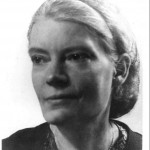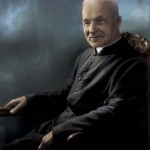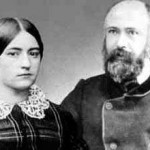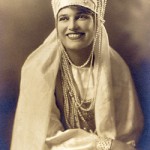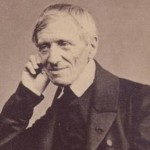 Everyone, take a look around, please, and see if you can spot which people in the church are struggling. Can you see who’s struggling with sin and who isn’t? Who’s struggling with their work? With their marriage?
Everyone, take a look around, please, and see if you can spot which people in the church are struggling. Can you see who’s struggling with sin and who isn’t? Who’s struggling with their work? With their marriage?
Now some of you might be thinking, “He’s talking about me. How does he know?” The truth is I don’t know who’s struggling with what because everyone looks normal on the outside (well, almost everyone); none of us can tell who’s struggling with what. But I do know all of you are struggling with something. I know this because it’s human nature and we’re all fallen and we’re all sinners. But I’m absolutely convinced of this because of my experience: over and over again I’ve met people who look like they’ve got it together, but then we start talking and they admit, for example, that they’re unhappy in their marriage, have thought about divorce, have a mental illness, are struggling with pornography, are going to a counsellor, have had an abortion, have lost their job and confidence, have thought about or attempted suicide, struggle with depression, struggle with same-sex attraction, have low self-esteem.
This experience has happened to me so many times that I’m no longer surprised. I used to think what all of us think when we hear of someone’s problems: “Wow, I would never have thought that you had such big problems.”
And when I asked you to see if you can spot who’s struggling at St. Anthony’s, did anyone chose me? Or do people think priests don’t have problems? The truth is I have my struggles too. I’ve had big struggles in my life. I’ve committed mortal sins in my life—I’m not proud of it, but it’s true.
A friend of mine once revealed to me, after I had known him for a few years, that he had a mental illness and had always struggled with suicidal thoughts. On the outside, he looks perfect: devout Catholic? Check. Great family? Check. Good job? Check. I would never have guessed he had a mental illness because he never showed it or talked about it. But I wasn’t blown away by it, and it didn’t change our friendship. Why should it? He’s my friend and has struggles just like I do.
 We all tend to feel we’re the only ones who have problems. We feel isolated, stigmatized, that no one understands us, and that we’re limited. Those of us who want to become saints think we can’t become holy because saints are perfect, right?
We all tend to feel we’re the only ones who have problems. We feel isolated, stigmatized, that no one understands us, and that we’re limited. Those of us who want to become saints think we can’t become holy because saints are perfect, right?
Today, St. Paul mentions “encouragement in Christ,” and I realized how much people are in need of encouragement. In Roman 15:5, he talks about the “God of encouragement.” One great encouragement for everyone is to know they’re not alone. The devil likes to keep us alone and isolated from our brothers and sisters, whereas God reminds us that we’re a family and everyone in this family has problems.
Did you know that the saints had problems and sins just like we do?
- Dorothy Day, who’s up for canonization, had an abortion.
- Bl. Matt Talbot was an alcoholic.
- St. Andre Bessette of Montreal had problems with anger and could be very rude.
- St. Elizabeth Ann Seton was devastated at the deaths of her eldest daughter, Anne Marie, when she was 16, and her youngest daughter, Rebecca, when she was 12. St. Elizabeth was also abandoned by her friends when she became Catholic.
- St. Martin de Porres was abandoned by his father because of his dark skin.
- Bl. Magadalene of Canossa was abandoned by her mother.
- St. Benedict Joseph Labre tried to become a priest four times but was turned away because of his mental illness.
- Bl. Louis Martin, St. Therese’s father, had many strokes.
- Catherine de Hueck Doherty, another candidate for canonization, seriously thought about suicide three times. Once she went to the Brooklyn bridge and was ready to jump but didn’t.
- Bl. Frederic Ozanam suffered from loneliness because he didn’t have satisfying friendships.
- St. Jane Frances de Chantel was distraught by the death of her husband.
- St. John XXIII lived in poverty.
- St. Catherine of Genoa’s husband cheated on her many times.
- St. Monica the victim of verbal abuse from her husband.
- Bl. John Henry Newman, the most famous Anglican theologian said that, “As a Protestant, I felt my religion dreary, but not my life – but, as a Catholic, my life dreary, not my religion.” This was part of the purifying process that all of us go through.
- St. John Vianney was a bad student. His report card read: Application–good; Conduct–good; Character–good; Knowledge–Very weak. He gives all priests struggling with their studies a lot of hope!
- Bl. Charles de Foucauld lost his faith and struggled with lust.
- St. Augustine was also a lustful man and he and St. Margaret of Cortona both had children out of a wedlock.
My favourite saint is St. Peter because he messes up so much. Right after his ordination, he denies God and his best friend three times. After his repentance he still realizes he’s so incapable of love. He tries but he knows his weakness. When talking about the arguments and controversies among the saints of the early church, Pope Emeritus Benedict XVI said, “I find this very comforting, because we see that the saints have not ‘fallen from Heaven.’ They are people like us, who also have complicated problems.”
One reason why the Catholic Church is awesome is the saints, our older brothers and sisters who messed up big time, were beset by huge problems, but were sanctified by Jesus. Find a saint you can identify with and become their friend! There’s hope: if they can make it, so can we!
Knowing this, however, should not be used as a justification for sinning. It simply means that our sins don’t define us, that God can still bless us, and that we should struggle against our sins as the saints did.
I always tell people, “Share your stories.” Not that we do it indiscriminately, but God will put you in the right place at the right time to tell people that they’re not alone. We can say to others, “I know what you’re going through. I went through the same thing, but God helped me.”
My parents never should have been married. (I always tell my mom, “Mom, there’s only one good thing that came out of your marriage: me.” And my brothers too, I guess.) But God healed their bad marriage. I once told this to a fallen-away Catholic who I met at a retreat because it seemed to me that she was deeply wounded and needed encouragement. She said, “You’re very open about your parents’ marriage.” I responded, “That’s because I realize my parents aren’t the only ones struggling.”
“Retrouvaille” (French for ‘rediscovery’) is an amazing Catholic ministry for married couples who are ready for divorce, whose marriage is about to end. Sitting in on one of their weekend talks, I once heard a couple share the hell they had been through: the mistrust, the infidelity, the repeated lying, the betrayal, the silent treatment. I told them afterwards that their story was like reality TV, but infinitely better because it gave hope. God healed this couple’s marriage, and now they’re helping others.
Next year, 2015, will be the 90th anniversary of St. Anthony’s. We’ll put together a commemorative booklet and we’ll have a part in it where we can share the beautiful things God has done in our life: perhaps a conversion, a miracle we’ve witnessed, or how God helped us. If a paragraph or a page about what God’s done for us or about our struggles can help just one person, then it’s worth it. I’ll go first to get the ball rolling.
Don’t have to be embarrassed by your sins and failures. Be sorry for them and go to Confession. Don’t be embarrassed by your problems. The saints had the same problems and they made it with God’s help. You are not the only one struggling.
